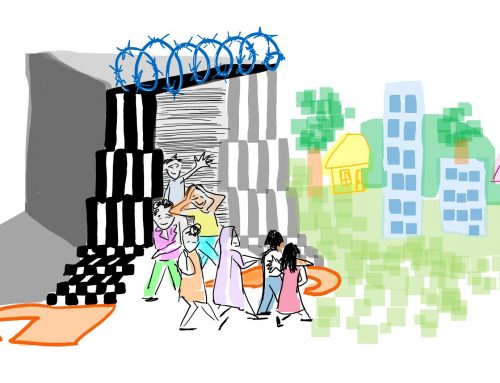Anna Pincus
Director, Gatwick Detainees Welfare Group
During the time of Covid-19, fear has felt corrosive. Loss of agency has been a defining characteristic of life. For those in detention, total loss of freedom is the norm underpinned by a terrible loss that is central to the dehumanising nature of detention. People in detention describe their sense of loss of self. With reduced flights and few removals, and the sense of court progress slowing, people in detention asked what was the point of their continued incarceration? Many of us in the Detention Forum have witnessed a pandemic of desperation in detention.
This pandemic of desperation found its expression in self-harm, protest, food refusal. People felt ‘left behind’ as centres emptied. There has been fear of Covid-19 in detention and rumours have spread, social distancing has been impossible, people who reached the criteria for shielding remained in detention. Before lockdown, people in detention could present to welfare teams, to healthcare, to ask for help, now they had to wait until the welfare team came to their wing or post a slip of paper to request an appointment. For some people unaware of the post box or unable to write, this was a greater problem than a lack of immediacy of contact. But we have seen the impact of loss of the potential for spontaneity. There is a sense of helplessness that is profound.
With the suspension of visits during lockdown, without Samaritans walking through the Centre, with visitors groups giving phone support but not in the Centre for drop-in sessions, with the IMB not appearing in person, with legal advice not being face to face, with Medical Justice doctors making reports over the phone, without BID legal advice surgeries, there has been a lack of access to information, a lack of independent oversight, lack of support and somehow a lack of recognition that all the previous human interactions offered.
Detention Forum believes detention is not the answer for anyone. There is no just cause to detain anyone without judicial oversight as an administrative convenience for an indefinite period. What could be just cause? Not the historic offending without supporting evidence from probation given as reasons for detaining ex-foreign national prisoners, not people held in detention after being granted bail in principle because accommodation could not be found. These nightmare scenarios are being tested in the courts and brilliant work is being done by excellent lawyers but we are all diminished by the continuing injustices including those after detention, when people are released to homelessness and destitution.
And now as our visitors resume their work, as we pick our way back through the rubble of loss, we have found new barriers in the name of risk assessments and security. Where previously we could take clothes into detention, for some time this was not permitted. We could send clothes through the post, but delivering a bag was not allowed. We investigated the science and were not aware that a virus shed on a surface lasted indefinitely. We offered to make up bags and leave them to stand for any required period before delivery. Forbidding clothes deliveries appeared to be a disproportionate response to the current situation.
In Brook House, we are now permitted to take clothes into the Centre but it has been a strange time leading up to this point. Donated clothes were perceived as a threat and yet it is acceptable to incarcerate people indefinitely so that their health is impaired through literal and psychological isolation, and so that their families suffer in the name of the hostile environment intended to inflict harm. We find ourselves in a pandemic of desperation. It is a moment of danger when attention is focused elsewhere and the Detention Forum has a role that is ever more needed to call for an end to immigration detention for all.





